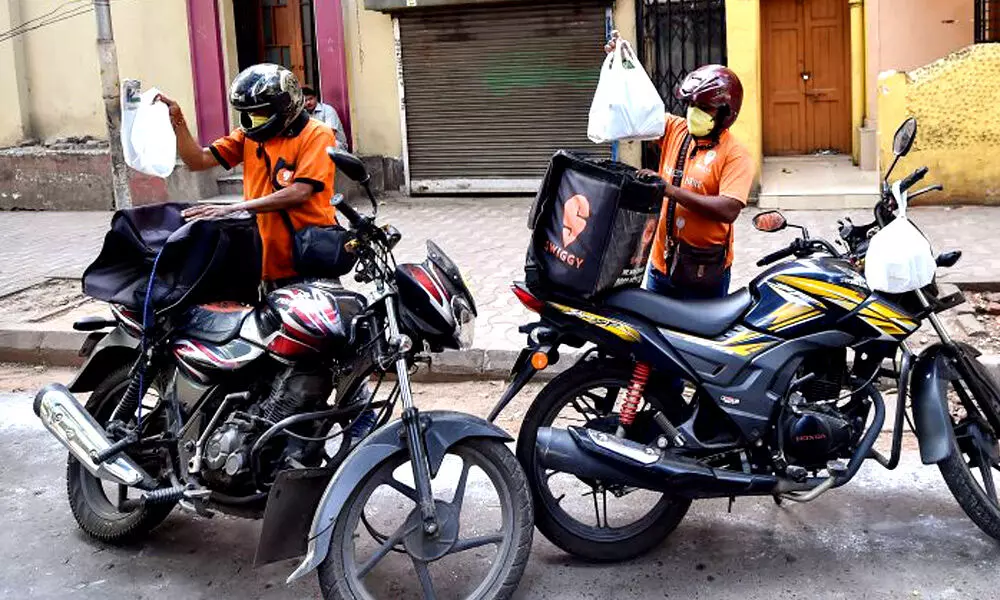Mirage or opportunity? Seeking fair play in gig work
Fairwork India Ratings 2021 report highlights working conditions of App-based gig workers
image for illustrative purpose

Odd Work
- In 2021, no platform scored more than 7 out of 10.
- Decline in take-home earnings of workers
- They still prone to road accidents, theft, violence in their work
- Increase in work-related costs
- Addl risk of contracting Covid-19 virus in the past year
Mumbai: The Fairwork India Team, spearheaded by the Centre for IT and Public Policy (CITAPP), International Institute of Information Technology Bangalore (IIIT-B), in association with Oxford University, presents the Fairwork India Ratings 2021: Labour Standards in the Platform Economy report. The report examines the working conditions of app-based gig workers. In its third year, the study assesses eleven platforms, from service-domains such as domestic and personal care services, logistics, food delivery, e-pharmacy and transportation.
Fairwork focuses on five principles of fair gig work: fair pay, fair conditions, fair contracts, fair management, and fair representation. This study evaluates and awards a basic and an advanced point to a platform for each principle. Thus, a platform can earn a maximum of ten points.
"We hope that platforms, workers, regulators and consumers, will use the Fairwork framework and ratings to imagine, and realize, a fairer platform economy in India", said Professors Balaji Parthasarathy and Janaki Srinivasan, the Principal Investigators of the team.
Researchers Mounika Neerukonda, Pradyumna Taduri, Amruta Mahuli, Kanikka Sersia, and Funda Ustek-Spilda, constituted the rest of the team.
Combining desk research, worker interviews, and evidence provided by the platforms, scores 11 platforms, including Amazon, Big Basket, Dunzo, Flipkart, Ola, PharmEasy, Porter, Swiggy, Uber, Urban Company and Zomato. This year, no platform scored more than seven out of the maximum of ten points, and none scored all basic points across the five principles. Key findings by principle are below:
The study reports a decline in take-home earnings of workers across platforms as increases in work-related costs (such as fuel costs and platform commissions) during the second wave of the Covid-19 pandemic reinforced a long-term decline in the incomes of gig workers due to decreases in rate cards and incentives. However, in consultation with the Fairwork project, three platforms have committed to ensuring minimum wage after accounting for work-related costs for all their gig workers.
Most platforms were unable to effectively mitigate occupational risks that workers routinely face, including road accidents, theft, violence, and adverse weather conditions, in their work. Workers also faced the additional risk of contracting the Covid-19 virus in the past year. Three platforms provided their workers with accident insurance policies, had taken steps to improve claims processes and raise awareness of accident insurance, and had in place responsive emergency helplines.
To deal with the threat of Covid-19, they also provided masks, sanitizers, a Covid-19 vaccination drive and insurance cover. Other platforms were either making policy changes, or were in the process of implementing them, to deal with the various occupational risks faced by workers.
There was an improvement in the accessibility and readability of contracts. Several platforms provided agreements in multiple languages. However, the comprehensibility of contracts remains a challenge, and many platforms lack either a defined notification period, or a process, before changes are made to worker terms and conditions. Three platforms have committed to reducing the asymmetry in liabilities imposed on workers. Yet, the (mis)classification of gig workers as independent contractors or partners, continues.

